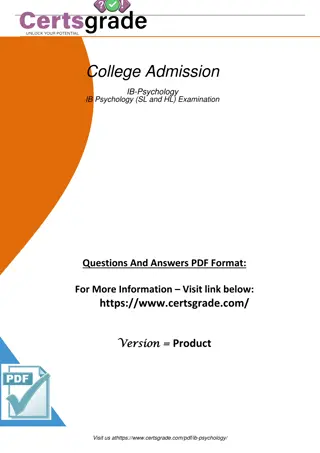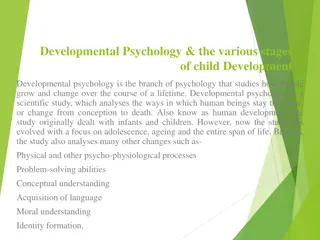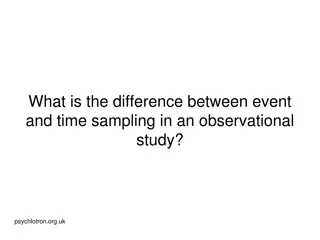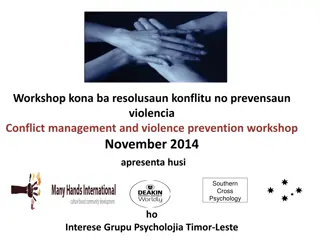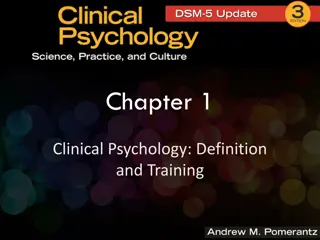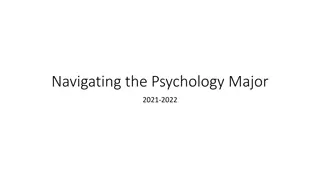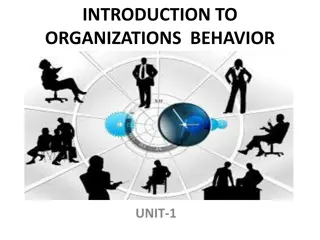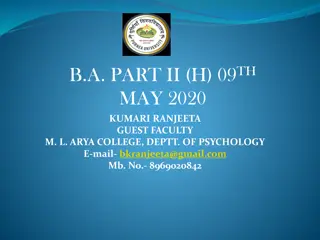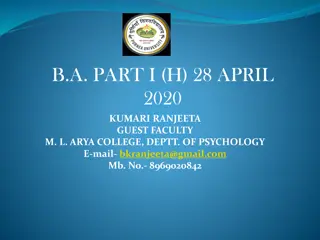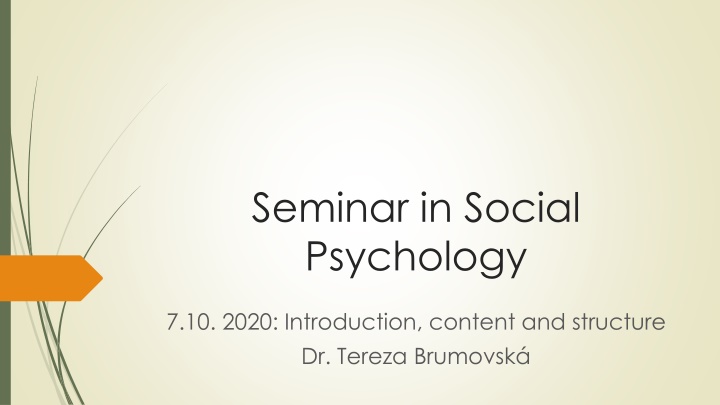
Seminar in Social Psychology: Structure and Assessments
Explore the structured seminar in social psychology led by Dr. Tereza Brumovsk, focusing on readings, presentations, written exercises, webinars, and assessments to enhance academic skills and prepare for the final essay and exam.
Download Presentation

Please find below an Image/Link to download the presentation.
The content on the website is provided AS IS for your information and personal use only. It may not be sold, licensed, or shared on other websites without obtaining consent from the author. If you encounter any issues during the download, it is possible that the publisher has removed the file from their server.
You are allowed to download the files provided on this website for personal or commercial use, subject to the condition that they are used lawfully. All files are the property of their respective owners.
The content on the website is provided AS IS for your information and personal use only. It may not be sold, licensed, or shared on other websites without obtaining consent from the author.
E N D
Presentation Transcript
Seminar in Social Psychology 7.10. 2020: Introduction, content and structure Dr. Tereza Brumovsk
Welcome to the Seminar Seminar is structured as a tool for CESS in social psychology: Work with the recommended literature: Your reading, commented ppt presentations (available in Moodle night before the seminar) Written exercise 500 words on the question related to the text (part of your assessment) each seminar will have time for this short paper after ppt presentation. 3 Webinars: Live discussion and Q&A session on the texts, your feedback (4thNovember, 25th November, 9thDecember) Essay of 2000 words with questions released on the Webinar on 9thDecember and deadline on 16thDecember. Individual feedback on your Essay and space for your feedback on 6thJanuary (Live Webinar)
Work with the literature: 1) (1968): Bystander intervention in emergencies: Diffusion of responsibility. Journal of Personality and Social psych ology, 1968 (8), 4, pp. 377-383. Darley, J. M. - Latan , B. Seminar on 14.10.2020: Presentation with comments on the text plus exercise (500 Words, part of your assessment). 2) ,1979). In Jost, J. T. (Ed); Sidanius, J. (Ed), (2004). Political psychology: Key readings. Key readings in social psychology., (pp. 276-293). New York, NY, US: Psychology Press. Tajfel, H.,Turner, J.C. The social identity theory of intergroup behaviour (The theory of intergroup conflict, Seminar on 21.10.2020 with commented ppt presentation and exercise (500 words, part of your assessment). Webinar 4thNovember 3) experiments. (125-190), 2nd ed New York: Mc Graw-Hill. Milgram, S. (1992): The individual and authority. In S. Milgram, The individual in a social world. Essays and 11thand 18thNovember: 2 ppt presentations and 1 written exercise on 500 words (part of your assessment) WEBINAR 25thNovember 4) Zimbardo, P. (2007): The Lucifer effect. How good people turn evil. London: Ebury Publishing. (258-323; 444- 491. Chapter 12, 13 and 16). Pennington, D. 2ndDecember: Ppt presentation and last written assessment of 500 words Webinar 9thDecember 16thDecember: Essay DEADLINE: 2000 words
Value of short assessment papers Short assessments are worth 10% of your final mark. Remember: It is an exercise to enhance your academic skills in working with the recommended texts and your writing and argumentation skills The short papers exercises prepare you for the final essay writing and finally for your CESS exam.
Short papers and ppt presentations Ppt presentations should help you to understand the texts and the structure of the arguments presented there Ppt presentations with comments are only the main points of the texts as I understand it. You can discuss these with your own understanding. Read the texts before the seminar and before listening to the ppt presentation. After reading, make short notes on the main points of the text as you understand it. Then compare it with the points in the ppt presentation. The comparison and contrast of your understanding with the ppt presentation can be a good baseline for your writing. The short assessment papers questions will lead you towards presentation and discussion of your own original ideas on the papers we work with.
Q & As Any questions or comments?
How to write a short assessment paper The aim is to train your writing skills, enhance you abilities in constructing an argument and discuss the text argument presented in the literature Make it short: 500 words max. Try to go into the point in your conclusion that logically turns out from the previous parts of your short paper. Structure: 1. Introduction: Say what is the argument you are going to present. Use the question and present how you will discuss it. Short. 2. Make an arguments with pros and cons if possible. Discuss your argument from different perspectives following the question. 3. Conclusion what is your conclusion? What did you learn?
Essay 2000 words limit Stick to the question. Make sure you recognize all parts of the question and discuss each part of the question accordingly. You need to read the recommended texts to be able to write the essay at the end. Make sure you do the references right according to the system of referencing you choose (e.g. Harvard referencing). We will refresh your referencing skills in the Webinar on 4thNovember, with Q & A s Do the structure of the Essay similar to your short papers, e.g.: 1. Introduction describe what you are going to discuss and why. 2. Discussion of pros arguments 3. Discussion of cons arguments 4. Conclusion Webinar on 9thDecember will release the essay questions and prepare you for writing, with Q&A s session too.


